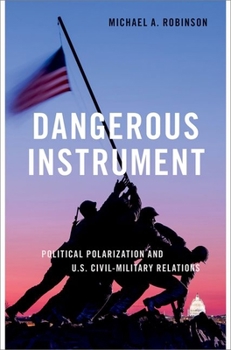Dangerous Instrument: Political Polarization and Us Civil-Military Relations
As increasingly contentious politics in the United States raise concerns over the "politicization" of traditionally non-partisan institutions, many have turned their attention to how the American military has been--and will be--affected by this trend. Since a low point following the end of the Vietnam War, the U.S. military has experienced a dramatic reversal of public opinion, becoming one of the most trusted institutions in American society. However, this trend is more complicated than it appears: just as individuals have become fonder of their military, they have also become increasingly polarized from one another along partisan lines. The result is a new political environment rife with challenges to traditional civil-military norms. In a data-driven analysis of contemporary American attitudes, Dangerous Instrument examines the current state of U.S. civil-military affairs, probing how the public views their military and the effect that partisan tribalism may have on that relationship in the future. Michael A. Robinson studies the sources and potential limits of American trust in the armed services, focusing on the interplay of the public, political parties, media outlets, and the military itself on the prospect of politicization and its associated challenges. As democratic institutions face persistent pressure worldwide, Dangerous Instrument provides important insights into the contemporary arc of American civil-military affairs and delivers recommendations on ways to preserve a non-partisan military.
Format:Hardcover
Language:English
ISBN:0197611559
ISBN13:9780197611555
Release Date:December 2022
Publisher:Oxford University Press, USA
Length:312 Pages
Customer Reviews
0 rating





